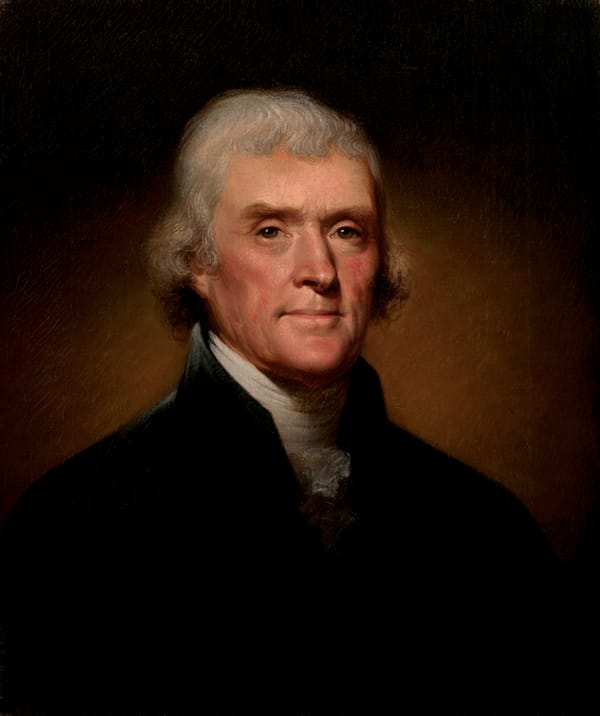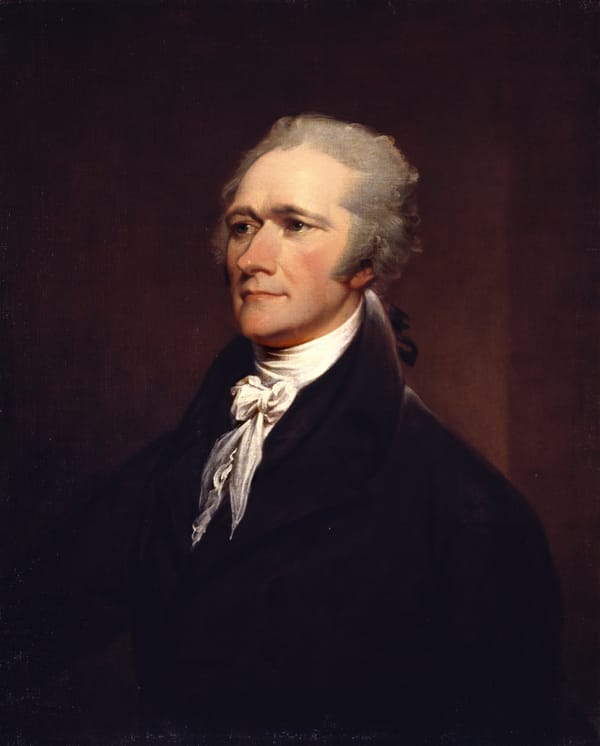Okay Fine Let's Overkill Trump's Argument in re Abrego Garcia

I know I said I mostly wasn't going to use this newsletter to do legal analysis of contemporary controversies. However. I think it's worth spelling out at some length everything that's wrong with the Trump Administration's claim of authority in the case of Kilmar Abrego Garcia and the others it has sent, or tried to send, to the CECOT gulag in El Salvador. Partly just because it's so very important, because the fate of the Republic hangs in the balance; partly because the whole saga has unfolded with fairly little spotlight on these underlying merits issues.
Some of the claimed authority is statutory, for instance the invocation of the 1798 Alien Enemies Act. (Yes, that would be part of the Alien and Sedition Acts, the ones that led to Jefferson's Revolution of 1800. Apparently this is the one that nobody ever bothered to get rid of.) But those claims cannot possibly support the Administration's view that the courts have no business even inquiring into any of this. That, instead, rests on this idea that the Constitution gives the president exclusive authority over foreign affairs. This is laughably, hilariously wrong. It is wrong both in that the premise is simply false and in that its implications would contradict other things in the Constitution.
Let's start with that first part. Does the Constitution give the president an absolute and exclusive authority over foreign affairs? Ha ha, no. Absolutely not. Go read Article II and tell me where it gives the president this power. I'll wait. It's not there. There are a couple of specific powers related to foreign affairs – the Commander-in-Chief power, obviously, the whole "receiving ambassadors" thing. But this plainly has nothing to do with the C-in-C power. As for receiving ambassadors, that has been interpreted quite broadly, including not only the power to conduct diplomacy but an exclusive power over recognizing foreign nations. (See Zivotofsky v. Kerry (2015).) But this case is really not about receiving ambassadors any way around. (There is one other specific power about foreign policy, but I'll save treatment of it for a moment.)
How about the general powers? The Vesting Clause gives the president "the executive Power." Whether this is an independent source of power, or simply a characterization of the specific powers granted later in Article II, is a source of some theoretical debate. Still, even accepting that it is a source of power, it would rather plainly seem to be a power to, well, execute the laws. Likewise the Take Care Clause, which can be seen either as a grant of all power necessary to "take care that the laws be faithfully executed" or, instead, only as imposing an obligation to do so, using the powers elsewhere conferred. Even if we see the Take Care Clause as a source of power, it is only a power to execute the laws. There is simply nothing in the text of Article II that would suggest that the president has absolute and exclusive power over all foreign relations.
Now, there is a line of cases, beginning with United States v. Curtiss-Wright Export Co. (1936), saying something like that the president has this kind of power. But I think those cases are better read to say that the president has sole authority to speak for the nation in foreign affairs: that is, it is the president alone who actually conducts diplomacy with foreign nations. This need not imply that the president alone has a role in setting our foreign policy.[1]
And indeed, it had better not imply that, because the Constitution very clearly says otherwise! We have been looking at Article II so far, but the real action is in Article I, Section 8, which lists the powers of Congress. Here's a sampling:
- The power to "lay and collect ... Duties, Imposts, and Excises," i.e. tariffs;
- The power to "regulate Commerce with foreign Nations;"
- The power to "regulate the Value ... of foreign Coin;"
- The power to "establish a uniform Rule of Naturalization;"
- The power to "define and punish Piracies and Felonies committed on the high Seas, and Offences against the Law of Nations;"
- The power to "declare War, grant Letters of Marque and Reprisal, and make Rules concerning Captures on Land and Water;"
- The power to "raise and support Armies," and a whole bunch of stuff basically elaborating on that point.
That's, uhhh, an awful lot that seems to do with foreign affairs! Congress literally has an express power to regulate all dealings with foreign nations! It has the power to declare war! Indeed, most of the text of Article I, Section 8 is foreign affairs stuff. The idea that the president has sole authority over foreign policy is simply a nonstarter, given all of this.
We often think of the enumerated powers as pertaining to federalism: they mark the boundaries between state and federal authority. But there is also a very real separation of powers aspect to it. It's been observed that much of what Article I, Section 8 does is take things that had been part of the royal prerogative in Britain and expressly assign them to the legislature. And that includes a ton of the king's foreign affairs powers, notably the power to declare war.
One royal prerogative not found in Article I, Section 8 is the treaty power. That's in Article II. But, of course, the president can only make treaties by and with the Advice and Consent of the Senate! This is maybe the single biggest problem for the claim that Trump's, ahem, agreement with Bukele is an unreviewable exercise of his inherent, exclusive authority. Indeed the structure of the treaty power is a nice little example of what I was saying about Curtiss-Wright. The business of negotiating treaties belongs only to the president. But making treaties, actually setting policy? That's something the president and the Senate do together.
Now, there is such a thing as an "executive agreement," essentially a treaty without Senate ratification. But by their very nature, executive agreements do not have force of law. They can only employ the powers that the president already has from other sources.
The whole notion that the president has an inherent, unreviewable authority to send people to CECOT, then, is just a fantasy. There isn't anything resembling a basis for it in the Constitution. But also we know it has to be wrong because it runs into all sorts of other constitutional provisions and restrictions. Like, say, the Fifth Amendment, which says that no person may be deprived of their liberty without due process of law. If nothing else this forbids extrajudicial imprisonment. The idea that the president has an inherent authority to, well, imprison people extrajudicially sits rather uneasily with such a provision! Similarly, the Constitution guarantees the right of habeas corpus, subject only to suspension by Congress. The entire point of the Great Writ is that anyone held in captivity, by private or public parties alike, can force their captor to state publicly the legal basis of their confinement. This has been called the bulwark of all other liberties; Trump & Co. are thumbing their noses at it.
There's also the Fourth Amendment (no unreasonable seizures, yes that includes seizures of persons). There's the First Amendment (no restrictions on free speech – I'm thinking here both of the people being deported for writing op-eds that the Administration doesn't like and just of the broader First Amendment implications of treating tattoos as proof of gang membership). Oh, and there's the goddamn Thirteenth Amendment, you know, the one that banned slavery!! Now I'm just a humble country constitutional philosopher, but to me it seems fairly straightforward that when it says "neither slavery nor involuntary servitude ... shall exist within the United States, or any place subject to their jurisdiction," that's not a secret license to engage in the slave trade as long as we're only exporting slaves.[2]
Do all of these human rights provisions apply in the context of foreign affairs, though? Yes. Yes, they do. We've literally been over this. Back in the 1950s there was a kind of panic about this in right-wing circles. People were afraid that the United Nations was going to trample all our freedoms somehow. A fellow by the name of Sen. John Bricker (R-OH) even went so far as to introduce a constitutional amendment stating that treaties could not violate the Constitution. This was a remarkably silly proposal on a number of levels (if it were otherwise true that treaties could violate the Constitution, how could a new constitutional provision fix that??); it flowed from a grave misunderstanding of the Supreme Court's decision in Missouri v. Holland (1920).
That case had held that a law implementing provisions of a treaty need not confine itself to the congressional powers enumerated in Article I, Section 8. Treaties, after all, are not mere acts of Congress. They are not formed out of the limited portion of the People's sovereign authority given to the national legislature. Rather, they are formed of the sovereign power itself, whole and undivided – one of the only occasions on which that power is stirred to action, the other being constitutional amendments. Right-wingers (including but not limited to the Birch variety) thought this meant that treaties could violate the Bill of Rights; hence the Bricker Amendment.[3] Eventually the Supreme Court had to issue a decision, Reid v. Covert (1957), making clear that, no, treaties still had to observe the limits of the Bill of Rights, which diffused the push toward amendment.[4]
Now think about that. According to Covert, even the treaty power, which per Missouri v. Holland is the entire, undivided sovereignty of the American People, cannot violate the Bill of Rights. It is unthinkable, given this, that any inherent power the president might possibly claim could do so. That would be to say that the president has powers above and beyond any delegated to him by the People. Gosh, I wonder why Trump might be drawn to such a proposition.[5]
The factual posture of Curtiss-Wright is a little weird, incidentally. Technically it's a nondelegation case! Congress had given the president the power to embargo arms shipments to certain countries as a means of resolving a war in South America. This was right around the time that the Supreme Court was striking down various parts of the New Deal under the nondelegation doctrine, see e.g. Schecter Poultry v. United States (1935). So when the Curtiss-Wright Court said that the president had independent foreign affairs powers, it was a way of sustaining this delegation. Once the framework of the Steel Seizure Case was in place, such a finding would have been unnecessary: it is enough that the measure in question was within Congress's authority. ↩︎
Of course there is a carveout for prison labor. But if you read it, it says "as punishment for a crime whereof the party shall have been duly convicted." Plainly not applicable here. ↩︎
This fear wasn't completely insane, or I should say might not have been insane in the antebellum Constitution when the Bill of Rights limited only the national government. The Federalists, after all, had argued the Bill of Rights merely reflected the existing limits on the enumerated powers of Congress. If that were so, then wouldn't Missouri v. Holland imply that a treaty could transgress the Bill of Rights? But the Fourteenth Amendment transformed the Bill of Rights into a command that the American government at all levels respect human rights. ↩︎
The question of whether the Bill of Rights applies "extraterritorially" is slightly different, but also not relevant here, where the abuses at issue are occurring in the territorial United States. ↩︎
Granted, the Supreme Court's decision in Trump v. Hawaii (2018) did not help matters. There they seemed to say that Congress's "plenary" power over immigration was not bound by, e.g., the First Amendment's protections of religious freedom. Now we see why this was such a dire mistake. ↩︎

